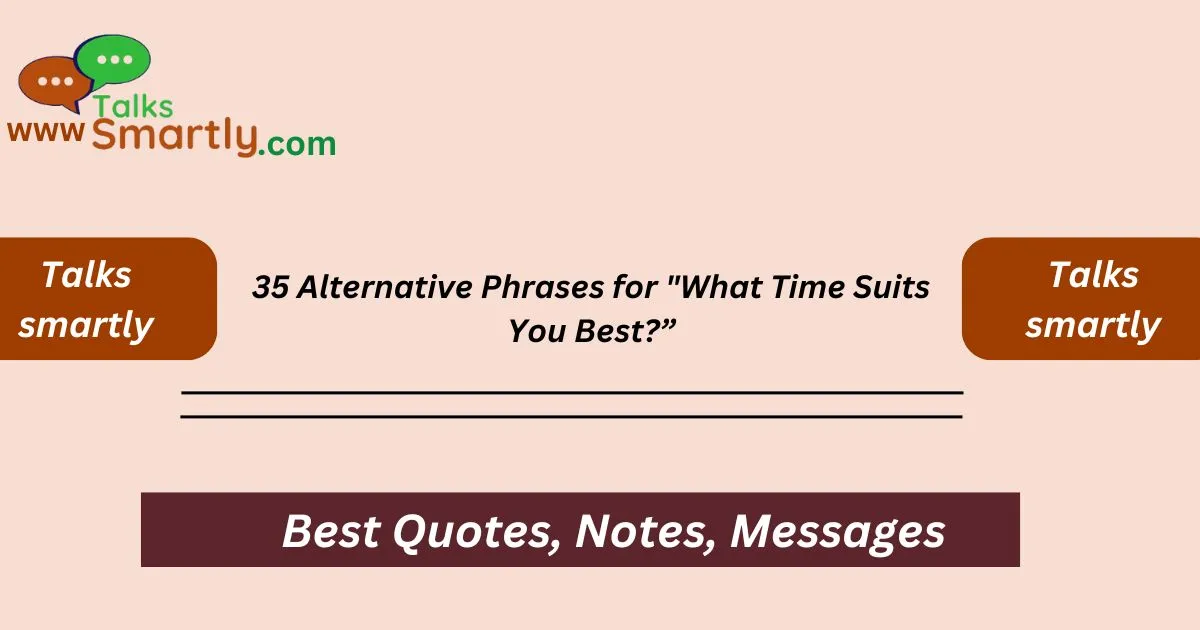“Looking for new ways to ask about the best time for a meeting? Here are alternative phrases for “What time suits you best”
When scheduling a meeting or event, asking someone “What time suits you best?” is a common and polite way to find a suitable time. However, if you want to diversify your language or add a bit of variety to your communication, there are many alternative phrases you can use. Each alternative can help convey your request in a slightly different tone or style, depending on the context and your relationship with the person.
Using varied phrases can also help you appear more engaging and adaptable in professional and personal settings. It’s always useful to have a range of expressions at your disposal to match different situations and preferences.
In this blog post, we’ll explore 35 alternative phrases to “What time suits you best?” These phrases can be used to request scheduling information in a way that is fresh, versatile, and tailored to various contexts. Whether you’re organizing a business meeting or planning a casual get-together, these alternatives will enhance your communication skills and help you connect more effectively.
Alternative Phrases for “What Time Suits You Best?”
- “When is a convenient time for you?”
- “What time works best for you?”
- “Can you suggest a time that fits your schedule?”
- “When are you available?”
- “What time would be most suitable for you?”
- “What’s your preferred time?”
- “When would you be free?”
- “Could you let me know your available times?”
- “What time are you best able to meet?”
- “Please share your available time slots.”
- “What time would work for you?”
- “When can you make time?”
- “Could you provide a few times that are good for you?”
- “What time do you have open?”
- “When would you like to meet?”
- “What’s your schedule like?”
- “What time is good for you?”
- “When is a good time for us to connect?”
- “What time can you manage?”
- “When can we schedule our meeting?”
- “Could you tell me when you’re free?”
- “What times are convenient for you?”
- “What time do you suggest?”
- “When can we make this happen?”
- “When would be a good time to talk?”
- “When are you next available?”
- “What time frame works for you?”
- “When can we find a time to meet?”
- “What time would be ideal for you?”
- “What’s a good time for us to touch base?”
- “When would you prefer to have our meeting?”
- “Could you let me know a time that works for you?”
- “What time slot suits your calendar?”
- “When would you be able to meet?”
- “What time would be most convenient for you?”
1. “When is a convenient time for you?”
This phrase focuses on convenience, making it clear that you want to accommodate the other person’s schedule.
Example: “I’d like to schedule a meeting. When is a convenient time for you?”
2. “What time works best for you?”
This is a direct and simple way to ask for the other person’s preferred time.
Example: “We need to arrange a call. What time works best for you?”
3. “Can you suggest a time that fits your schedule?”
This phrasing invites the other person to propose a time that is suitable for them.
Example: “I’m available next week. Can you suggest a time that fits your schedule?”
4. “When are you available?”
This is a straightforward and flexible way to ask about the other person’s availability.
Example: “Let’s set up a meeting. When are you available?”
5. “What time would be most suitable for you?”

This phrase emphasises suitability and respect for the other person’s time.
Example: “I’m arranging a conference call. What time would be most suitable for you?”
6. “What’s your preferred time?”
A concise and direct way to ask about the other person’s choice of time.
Example: “For our next meeting, what’s your preferred time?”
7. “When would you be free?”
This informal phrase asks about the person’s availability in a casual tone.
Example: “Let’s meet next week. When would you be free?”
8. “Could you let me know your available times?”
Requests the other person to provide a list of times they are available.
Example: “We need to finalise a schedule. Could you let me know your available times?”
9. “What time are you best able to meet?”
This phrase is a bit more formal and focuses on the person’s ability to attend.
Example: “I’m planning our meeting. What time are you best able to meet?”
10. “Please share your available time slots.”
Asks the other person to provide several options for when they can meet.
Example: “I need to book a slot. Please share your available time slots.”
11. “What time would work for you?”
A casual and approachable way to inquire about the person’s preferred time.
Example: “To arrange our meeting, what time would work for you?”
12. “When can you make time?”
This phrasing suggests flexibility and is useful for informal situations.
Example: “We need to catch up. When can you make time?”
13. “Could you provide a few times that are good for you?”
Requests multiple options from the other person to choose from.
Example: “Let’s schedule a call. Could you provide a few times that are good for you?”
14. “What time do you have open?”
This phrase is straightforward and asks for the person’s open time slots.
Example: “We need to plan a meeting. What time do you have open?”
15. “When would you like to meet?”
This phrasing invites the other person to suggest a time that suits them.
Example: “For our discussion, when would you like to meet?”
16. “What’s your schedule like?”
A broad inquiry about the person’s availability, allowing them to provide details.
Example: “I’d like to coordinate our meeting. What’s your schedule like?”
17. “What time is good for you?”
A friendly and direct way to ask for the best time for the other person.
Example: “To set up our appointment, what time is good for you?”
18. “When is a good time for us to connect?”
This phrase is slightly formal and asks about a mutually convenient time.
Example: “For our project meeting, when is a good time for us to connect?”
19. “What time can you manage?”
Focuses on the person’s ability to fit the meeting into their schedule.
Example: “To arrange our discussion, what time can you manage?”
20. “When can we schedule our meeting?”
This phrasing is direct and seeks to find a suitable time for scheduling.
Example: “Let’s finalise the time. When can we schedule our meeting?”
21. “Could you tell me when you’re free?”
A straightforward request for the person’s free time slots.
Example: “To set up a call, could you tell me when you’re free?”
Alternative Phrases for “All Protocols Observed
22. “What times are convenient for you?”
Asks for times that fit well with the person’s schedule.
Example: “For our next meeting, what times are convenient for you?”
23. “What time do you suggest?”
Invites the person to propose a time that works best for them.
Example: “Let’s coordinate. What time do you suggest?”
24. “When can we make this happen?”
This phrasing adds a sense of urgency and action to finding a time.
Example: “To get this done, when can we make this happen?”
25. “When would be a good time to talk?”
A casual way to ask for a suitable time to have a conversation.
Example: “We need to discuss the project. When would be a good time to talk?”
26. “When are you next available?”
Asks about the person’s next available time slot.
Example: “To plan our catch-up, when are you next available?”
27. “What time frame works for you?”
Inquires about a range of times that are suitable for the person.
Example: “For our meeting, what time frame works for you?”
28. “When can we find a time to meet?”

This phrasing focuses on finding a mutually agreeable time.
Example: “To schedule our appointment, when can we find a time to meet?”
29. “What time would be ideal for you?”
Focuses on the person’s ideal time, making it clear you want to accommodate them.
Example: “For our discussion, what time would be ideal for you?”
30. “What’s a good time for us to touch base?”
Uses a business-friendly phrase to ask about scheduling a meeting.
Example: “We need to follow up. What’s a good time for us to touch base?”
31. “When would you prefer to have our meeting?”
Asks for the person’s preference, adding a touch of courtesy.
Example: “To arrange our meeting, when would you prefer to have our meeting?”
32. “Could you let me know a time that works for you?”
Requests a time that is convenient for the person, adding politeness.
Example: “To schedule our call, could you let me know a time that works for you?”
33. “What time slot suits your calendar?”
This phrase is a bit formal and asks about a time that fits within the person’s schedule.
Example: “To finalise our plans, what time slot suits your calendar?”
34. “When would you be able to meet?”
Inquires about the person’s availability in a straightforward manner.
Example: “For our next session, when would you be able to meet?”
35. “What time would be most convenient for you?”
Focuses on the convenience of the person, showing consideration for their schedule.
Example: “To set up our meeting, what time would be most convenient for you?”
ANSWER TO KEY QUESTION
1. What are some formal alternatives to “What time suits you best?”
You can use phrases like “What time would be most suitable for you?” or “When is a convenient time for you?” for formal situations.
2. How can I ask about availability in a casual setting?
Try phrases like “When would you be free?” or “When can you make time?” for a more relaxed approach.
3. Are there alternatives that emphasise urgency?
Yes, you can use phrases like “When can we make this happen?” or “When can we find a time to meet?” to convey urgency.
4. What’s a polite way to request multiple time options?
Phrases such as “Could you provide a few times that are good for you?” or “Please share your available time slots” work well for this.
5. How can I make my request for scheduling more engaging?
Consider using phrases like “What time would work best for us to connect?” or “When would you prefer to have our meeting?” to make the request more engaging.
Conclusion
Choosing the right phrase to ask about scheduling can make a significant difference in how your request is received. By using one of the 35 alternative phrases listed in this blog post, you can tailor your communication to fit various contexts, whether formal, casual, or urgent.
Each phrase provides a unique way to express your request and shows consideration for the other person’s schedule. By diversifying your language, you not only make your interactions more engaging but also enhance your overall communication skills.












